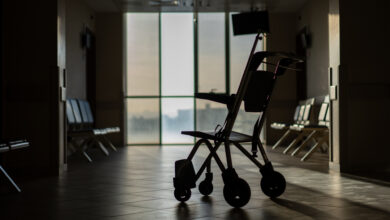Global headlines
UK calls for minimum staffing levels and fewer health assistants
The care of the elderly is being compromised in UK hospitals because there are too few nurses, says the Royal College of Nursing. Research by the RCN suggested everything from basic communication to care for the dying was suffering, BBC News reports. The college said it was now time to insist on strict staffing levels and stop relying on healthcare assistants to fill the gaps. It polled nearly 1700 nurses - 240 of whom were working on wards with older patients. The survey showed that while older people’s wards only had one nurse for every nine patients on average, general wards, at 6.7 patients per nurse, and children’s wards, at 4.2, were much better staffed. The research looked at the use of guaranteed staffing rules in Australia and the US and concluded they were needed in the UK. The intervention by the RCN comes after a series of damning reports about the services the elderly are receiving. The Patients Association and Care Quality Commission have both recently published studies detailing poor levels of care. Ministers have promised to give more powers to nurses as well as improving monitoring to drive up standards. BBC
Fiji hour changes ‘concerning’
A Fiji pilot to replace a 40-hour week with three 12-hour shifts is concerning Fijian nurses who fear nursing care will be compromised, says former nurse leader Kuini Lutua. The Fiji Times reported in early February the Ministry of Health was changing working hours “in a bid to improve working standards and patient care”. The pilot was due to begin in Labasa Hospital followed by Lautoka Hospital and the Colonial War Memorial Hospital in Suva. Lutua, until very recently the general secretary of the Fiji Nursing Association, said the nurses affected were very unhappy about the move and concerned care standards would be compromised. She believed the pilot was a cost-cutting measure as nurses would now only be paid for 36 hours. Negativity over the move has been compounded by the Ministry of Health cutting night transport and night allowances for nurses. Lutua was also concerned about the impact on nurses’ health and their family and home responsibilities. The Fiji Times also quoted a ministry spokesman saying another reason for implementing the pilot was to cater for the increase in registered nurses in Fiji, which had risen to more than 2000 by the end of last year.
Trauma linked to epidemic of HIV
Physical violence, sexual abuse and other forms of childhood and adult trauma are major factors fuelling the epidemic of HIV/AIDS among US women, US research suggests. Scientists have known for years that traumatised women are at greater risk of becoming infected. Now, two studies from the University of California, San Francisco and Harvard Medical School demonstrate that a high rate of trauma among women already infected with HIV also plays a role in the epidemic. Described in papers in the journal AIDS and Behavior, the research shows women with HIV are exposed to trauma and suffer from post-traumatic stress disorder at rates far higher than those occurring in women in general. The studies may help to reframe many types of discussions about HIV/AIDS so that more clinicians take trauma into account when working with their patients. “For a long time we have been looking for clues as to why so many women are becoming infected with HIV and why so many are doing poorly despite the availability of effective treatment,” said Edward Machtinger, who directs the Women’s HIV Program at UCSF and who was the co-principal investigator on both studies. “This work clearly shows that trauma is a major factor in the HIV epidemic among women.”
Thumbs up for diabetes trial
A pilot of prescribing by diabetes nurse specialists (DNS) was safe, effective, and popular with patients according to an evaluation report. Health Workforce New Zealand publicly released the Evaluation of the Diabetes Nurse Specialist Prescribing Project report in late February and said the project would now move to the “second phase”. The new contract was likely to focus on supporting primary care nurses. Analysis of the data found no adverse events or hospitalisations attributable to DNS prescribing. The clinical audit by the project physicians found the prescribing was “clinically appropriate” and patient outcomes remained stable and showed an overall improvement in blood sugar results. The evaluation report, carried out by Massey University, said the evaluation suggested that DNS prescribing contributed to an effective specialist diabetes service but the timeframe was too short to enable productivity gains to be measured.
Email: [email protected]





